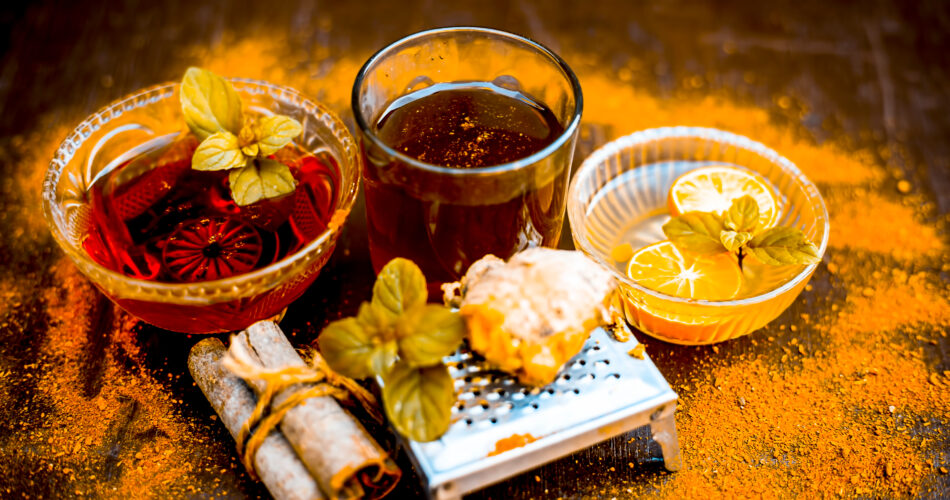There’s something inherently comforting about the idea of home remedies. The notion that, within the walls of your own home, you can find solutions to common health woes using ingredients from your kitchen is both reassuring and intriguing. Indian culture has a rich history of relying on these tried-and-true remedies, passed down through generations. In this comprehensive exploration, we’ll take a journey from Grandma’s kitchen to the modern world of medicine, exploring the wisdom and effectiveness of Indian home remedies.
The legacy of Indian home remedies
In Indian households, remedies for everything from a common cold to an upset stomach were often found in the kitchen cabinet or spice rack. These remedies were not just quick fixes but were rooted in centuries of traditional wisdom and often backed by Ayurveda, the ancient Indian system of medicine.
Turmeric: The golden healer
One of the shining stars in Indian home remedies is turmeric. Its vibrant golden hue isn’t just for adding colour to curries; it’s been revered for its potent anti-inflammatory and antibacterial properties. Turmeric milk (haldi doodh) has long been a go-to remedy for soothing sore throats and boosting immunity.
Ginger and honey: A dynamic duo
Ginger and honey, individually potent, become a dynamic duo in the world of home remedies. Ginger’s anti-nausea properties make it a go-to for motion sickness and morning sickness during pregnancy. Combining it with honey not only enhances the flavour but also soothes sore throats and helps with coughs.
Tulsi: The holy basil
Tulsi, or holy basil, isn’t just a plant you grow in your backyard; it’s a revered herb in Ayurveda. Known for its adaptogenic properties, it’s used to reduce stress and boost the immune system. Tulsi tea is a soothing home remedy that helps relieve anxiety and promotes overall well-being.
Cloves for toothaches
Ever had a sudden toothache in the middle of the night? Indian homes often turn to cloves for relief. Clove oil, applied to the affected area, has numbing properties that can ease the pain until a dentist visit is possible.
Modern validation of home remedies
While these home remedies have been trusted for generations, modern science has started to catch up. Researchers are delving into the science behind these traditional practices, and the results are often astonishing.
Turmeric’s curcumin power
The active compound in turmeric, curcumin, has been the subject of extensive research. Its anti-inflammatory properties have been found to be effective against various conditions, including arthritis and digestive disorders. Curcumin supplements are gaining popularity as a natural way to manage inflammation.
Ginger’s digestive benefits
Ginger’s digestive benefits have been confirmed by scientific studies. It’s known to ease indigestion, reduce nausea, and even alleviate menstrual pain. Ginger supplements and ginger teas are widely available for those seeking these benefits.
Tulsi’s stress-relieving magic
The adaptogenic properties of tulsi have gained recognition in the field of stress management. Tulsi extracts and supplements are being studied for their potential to reduce stress and anxiety levels.
Amla: The Vitamin C booster
Amla, or Indian gooseberry, is another gem in the world of Indian home remedies. Rich in vitamin C, amla is known for its immune-boosting properties. Consuming amla regularly can help ward off infections and improve skin health.
Cumin seeds for digestion
Cumin seeds, often used as a seasoning in Indian cooking, are renowned for their digestive benefits. They can help alleviate bloating, gas, and indigestion. A simple remedy is to chew on a few roasted cumin seeds after meals.
Honey: Nature’s sweet elixir
Honey, often referred to as the liquid gold of nature, is not only a natural sweetener but also a remedy with various health benefits. It has antibacterial properties and can soothe a sore throat when mixed with warm water or tea. Additionally, honey’s wound-healing properties have made it a part of traditional wound care in some cultures.
Neem: The skin savior
Neem, or Indian lilac, is a potent ingredient in traditional Indian remedies. It’s known for its antibacterial and antifungal properties, making it an effective remedy for skin conditions like acne and dandruff. Neem oil is commonly used for these purposes.
Ajwain: The digestive aid
Ajwain, or carom seeds, is a popular spice in Indian cuisine known for its digestive properties. It’s often used to relieve gas and indigestion. Consuming a teaspoon of crushed ajwain with warm water can provide quick relief.
Clove oil for toothaches
Clove oil, derived from cloves, has a long history of use in traditional remedies, particularly for toothaches. Its numbing and antibacterial properties make it effective in providing relief from dental pain. Research has shown that eugenol, a compound found in clove oil, has both analgesic (pain-relieving) and anti-inflammatory properties, supporting its traditional use in dental care.
Balancing home remedies and modern medicine
While the allure of home remedies is undeniable, it’s important to strike a balance between traditional wisdom and modern medicine. Home remedies can offer relief for mild ailments and provide comfort, but they may not be a substitute for professional medical advice and treatment.
Closing thoughts
Indian home remedies are a testament to the rich tapestry of culture and tradition that has woven its way into modern life. From turmeric’s golden glow to the soothing properties of tulsi, these remedies continue to find their place in our hearts and homes. As science unravels the mysteries behind these age-old practices, we gain a deeper appreciation for the wisdom of our ancestors.
So, the next time you sip on a cup of turmeric milk, reach for a ginger remedy, savor the tangy taste of amla, apply clove oil for a toothache, or enjoy the skin benefits of neem, remember that you’re not just benefiting from Grandma’s kitchen wisdom; you’re also embracing the gifts of nature and the insights of modern science. It’s a harmonious blend of tradition and progress that continues to enrich our lives.




